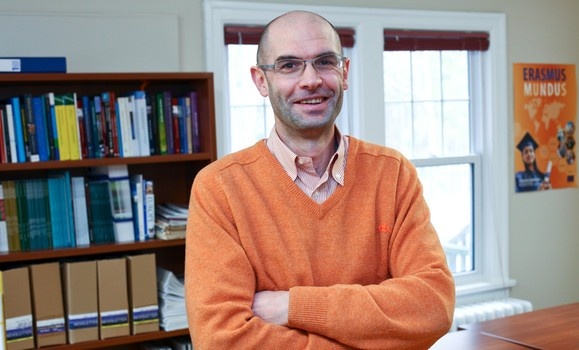There was a time recently when, as globalization and post-colonialism became dominant themes in political science, motivating students to study modern Europe was a challenge.
That is changing, according to Ruben Zaiotti, assistant professor in the Department of Political Science and incoming director of Dal’s European Union Centre of Excellence.
"[In the last] two or three years, the EU has been on the national news in Canada on almost a daily basis,” says Dr. Zaiotti, explaining that coverage of the ongoing Eurozone crisis has sparked a fixation among Canadians about the disharmonious present and wide open future taking shape across the Atlantic.
Dr. Zaiotti, a native Italian from a town north of Venice near the border with Austria, says that while this fixation is “not for good [i.e., fortunate] reasons, from my perspective it is definitely a good thing.”
A gateway of understanding
A multidisciplinary centre from its inception, the European Union Centre of Excellence (EUCE) at Dal is one of three such university-based, EU-sponsored Centres of Excellence operating in Canada. It facilitates research about contemporary European politics, as well as European-focused research in fields as disparate as sociology, anthropology, law, health, engineering and the environment.
Earlier this month, the European Commission announced that the şÚÁĎłÔąĎÍřcentre will be receiving €300,000 (more than $400,000 Canadian) over the next three years to support European Union-related academic activities.
The centre also supports students undertaking study programs in Europe and assists the mobility of academics arriving at Dal to deliver a speech or to teach a course about modern Europe.
Dr. Zaiotti wants the centre to expand its efforts in public outreach to involve more of “the general public [and] also policy makers and other stakeholders,” he explains.
As the new director, Dr. Zaoitti will continue and expand upon the work of the centre’s first director, Finn Laursen, who served in this role from 2006-2012.
“Finn’s contributions to the European Centre of Excellence at şÚÁĎłÔąĎÍřare considerable and admirable,” says Rob Summerby-Murray, dean of the Faculty of Arts and Social Sciences. While no longer director, Dr. Laursen continues his work at şÚÁĎłÔąĎÍřas Canada Research Chair in European Union Studies, housed in the Department of Political Science.Â
Caring about Europe
Dr. Zaiotti acknowledges that as much as Canadians are watching Europe closely, the political climate across the Atlantic is not always clear.
“People are puzzled,” he says. “Even policy makers in Ottawa are trying to figure out how exactly this regional organization [the EU] works.”
Struggle as they might to understand it, Canadian policy makers must come to grips with the EU because of, among other things, the potentially severe effects a worsening of the Eurozone crisis could bring about for the Canadian economy. Additionally, Canada is currently engaged with the EU in ongoing discussions on trade issues. Dr. Zaiotti says understanding the EU will be key in order to steer these discussions in a direction that benefits Canadians.
He also notes that the European political climate “represents an alternative to the U.S. in some economic issues [and in] overall Canadian foreign policy.” And there are “definitely some areas in which each side can learn from each other,” he adds.
In recent weeks, the severity of the crisis seems to have diminished. “We seem to be over the worst, at least for the time being,” says Dr. Zaiotti. But just as the economies and politics of the Eurozone show signs of a brighter future, a debate has surfaced within the UK over whether to leave the EU entirely, a possibility that “was not even considered” a few years ago, Zaiotti says.
A cross-Atlantic connection
Dr. Zaiotti notes that there is a “historical legacy of Europe here and there are still a lot of connections between the two sides.” EUCE has helped some Dal students tap into that connection through assisting their travel abroad.
VĂ©ronique Rendell-Fournier, a fourth-year Political Science honours student at Dal, travelled this past fall to Belgrade, Serbia to participate in Model European Union, an EU parliament simulation. She received funding through the EUCE which helped cover her travel and accommodation costs.
Travelling in Europe and studying the EU system “opens your eyes up to different points of view,” she says. She adds that travelling abroad is not only important for personal growth but also provides insights into other political systems and draws the question “How can we learn from them?” By witnessing how politics are conducted elsewhere, “you learn about your own system too.”

